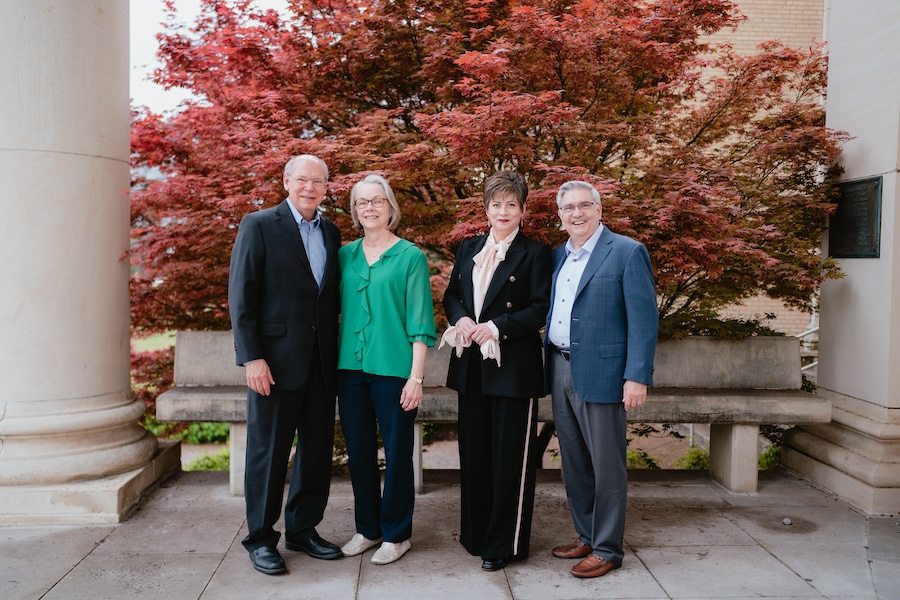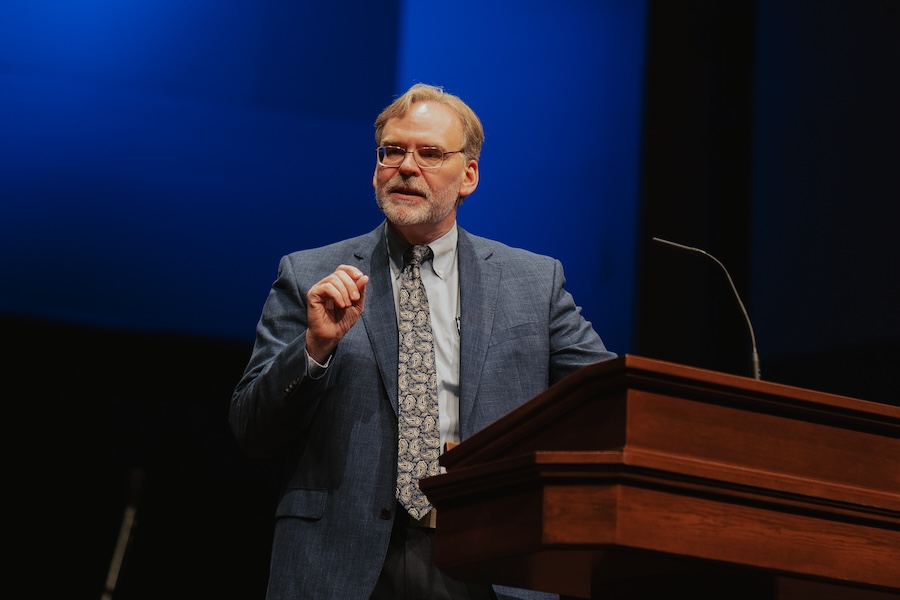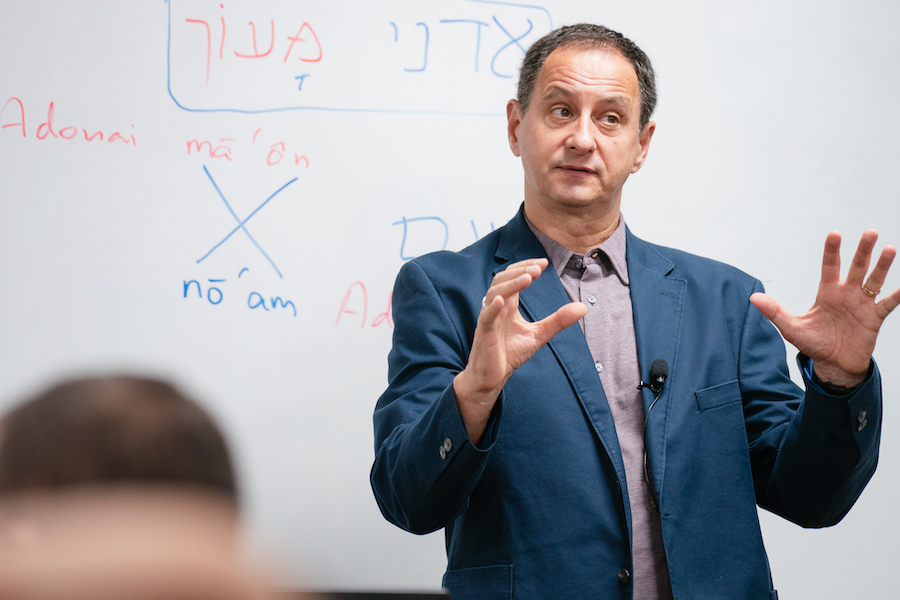Wicker models accurate biblical interpretation, creative teaching in the classroom
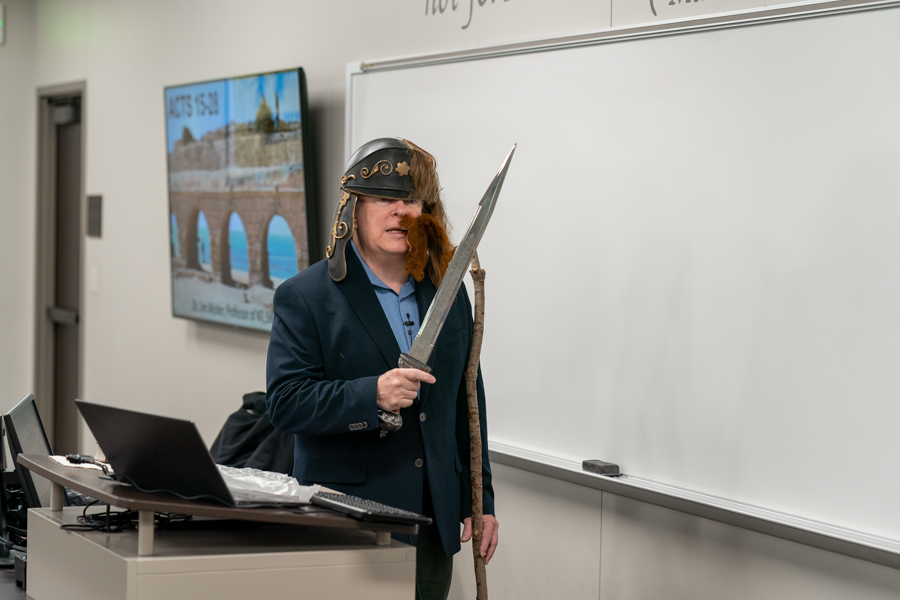
Whether he is dressed as a Roman soldier or a Jewish shepherd explaining the background of a New Testament text or supplying his class with 3D glasses to be at the empty tomb in a video he created, Jim Wicker, professor of New Testament at Southwestern Baptist Theological Seminary, seeks to teach his students not only how to accurately teach the Scriptures, but “model how to creatively teach it.”
Wicker, who has taught at Southwestern Seminary since 2000, said, “We’ve all heard boring lessons or boring sermons at some point,” noting that a messenger can be “accurate, but if you’re boring, they’re asleep.” Through magic tricks that he calls “Gospel illusions,” or using modern technology coupled with a skit to show the consequences of a verse of Scripture taken out of context, Wicker said when students leave his classroom at the end of the semester, his two-fold goal is for them to have a “better understanding of how to correctly interpret God’s Word and then an inspiration of how to creatively preach and teach God’s Word.”
The result has been a memorable classroom experience for his students, such as Karen Kennemur, professor of children’s ministry and Bessie Fleming Chair of Childhood Education. Kennemur, who had Wicker as a New Testament professor as she earned her Master of Arts in Christian Education at Southwestern in the early 2000s, said, “He really brought the New Testament alive for those of us that were in his class.”
Calling Wicker “the most creative professor” she had at Southwestern, Kennemur recalled that “every class period was going to be a new and different experience.” She remembers walking into the classroom one day and seeing 3D glasses on each desk. Wicker used a picture of Jesus’s tomb so that when the class put on the special glasses “it was remarkable that we felt like we were standing at the tomb looking at the tomb where they had laid Christ’s body,” Kennemur said. At the time, Kennemur did not know she would teach in theological academia, but Wicker’s example “really prompted me to understand that your teaching could be creative even in the seminary.”
Wicker’s innovation and creativity are still readily apparent to his students today, including Samuel Kim, a Master of Divinity student who was born in South Korea but raised in the Dallas-Fort Worth metroplex. Kim recalls a “Gospel illusion” Wicker used in class to reiterate what it means that Jesus has forgiven sins. The professor wrote “sin” on a special piece of paper and then lit it on fire and the word quickly disappeared. Kim said Wicker explained to the class that is how God views the sin of those who repent and confess their sins to Him.
Kim realized the visualization “can impact a kid but also grown adults who are master’s students.”
In course assignments, Wicker encourages his students to tap into their creative skills through the “Creative Biblical Arts Project.” He explained the purpose is “to show everyone can be creative” as they prepare to teach the Scriptures. Started in spring 2022 as extra credit and offered in the fall 2022 semester as a requirement in one class and extra credit in another, Wicker challenged students to share a biblical text creatively, including “writing a song, singing a song, painting, drawing, skit, Gospel illusion, spoken word” or anything else to be creative.
Under Wicker’s guidance, some students who believed they didn’t have any creative skills, such as a pastor in one of his classes, have learned otherwise. The student opted not to participate in the extra credit assignment in the spring 2022 semester explaining to his professor, “I’m just not creative.”
“You’re creative because you’re putting together that sermon,” Wicker told the student who is preaching weekly. “You have the text but then with your sermon, you’re creating that with your applications, illustrations, and all of that.” Wicker said for the student “the light bulb went off” because he was “thinking just because he couldn’t write a song, he’s not creative.”
Wicker added that everyone is creative “to some extent” in “different ways,” which is what he hopes “to both inspire and model in students.”
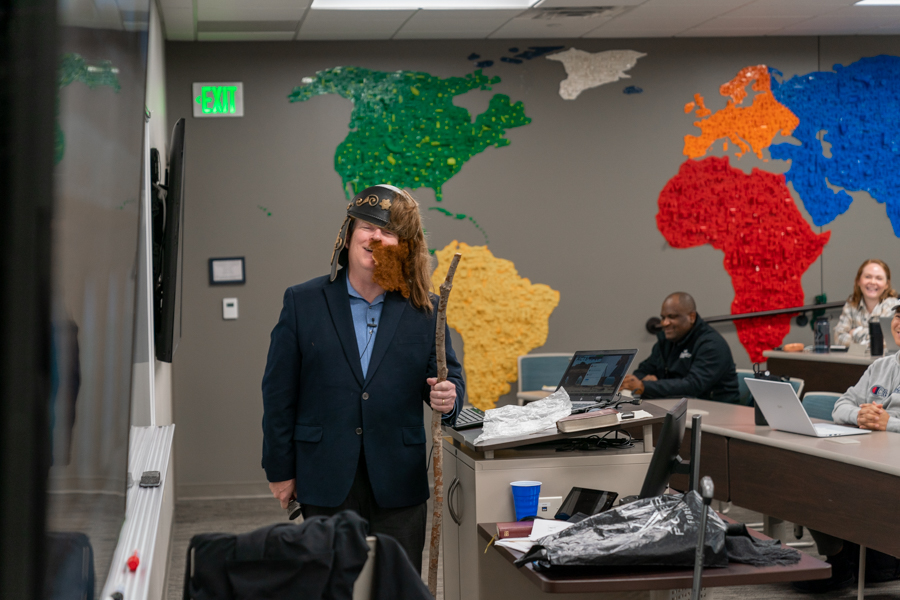
Wicker’s desire to use creativity to effectively teach and share the Gospel began at a young age. When he was a child, Wicker said he would perform Gospel illusions at children’s birthday parties, however, he stopped in junior high when other kids began to “make fun” of him and he “was embarrassed to do it.” While he was a student at Hillcrest High School in Dallas, Wicker and other friends began helping lead and facilitate Bible studies twice a week at the school. After a motorcycle accident in high school left him incapacitated, he and a friend wrote a comedy act that won the high school talent show, the State Fair of Texas, Key Club and Key Club International competitions, and opened doors for them to perform the show 365 times one summer at Six Flags over Georgia. Wicker recalled the experience was “invaluable” as it taught him how to read an audience.
It was not until he was an oral communications major at Baylor University, and leading weekly backyard Bible clubs in and around Waco, Texas, that Wicker began to use the Gospel illusions with children, presenting the plan of salvation several times, he recalled. After graduating from Baylor in 1977, Wicker began as a Master of Divinity student at Southwestern. While a student at the Fort Worth institution, Wicker began performing in shows alongside his Southwestern classmates, Neal Jeffrey, former San Diego Chargers quarterback and current associate pastor of pastoral and preaching ministries at Prestonwood Baptist Church in Plano, Texas, and Christian comedian Dennis Swanberg.
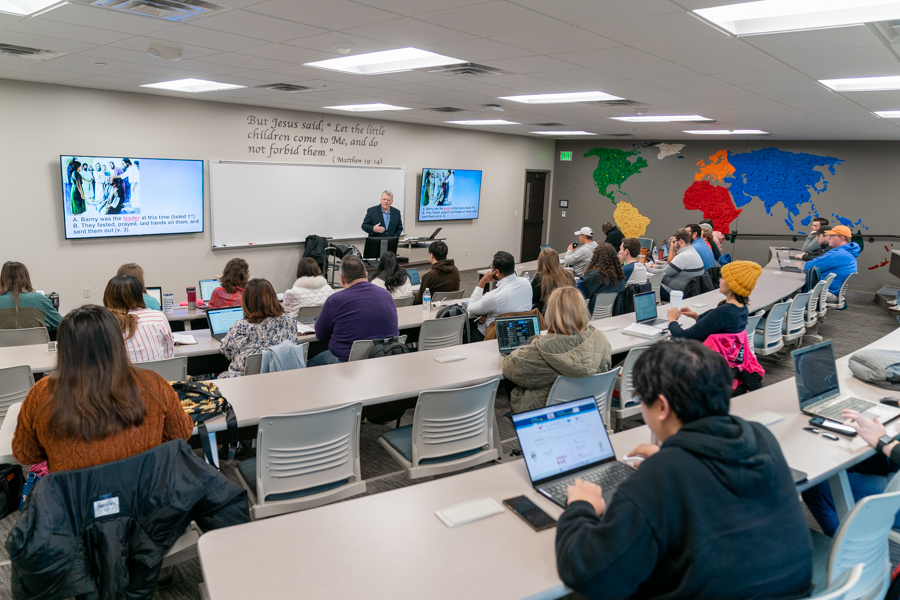
After graduating from Southwestern in 1980, Wicker began as the pastor of the First Baptist Church of Lavon, Texas, while simultaneously beginning work toward a Doctor of Philosophy degree at Southwestern. He recalled he pursued doctoral studies because he “wanted to teach” but thought he would “pastor in a college town and then teach in a local university.” In addition to First Baptist Lavon, over two decades Wicker pastored the First Baptist Church of Farmersville, Texas, and the First Baptist Church of Frisco, Texas, while also teaching at satellite campuses of Dallas Baptist University.
Wicker’s pastoral experience is evident to his students, said James Ross, a Master of Divinity student from Cross Plains, Texas. Ross first met Wicker during a prospective student lunch when he and his wife visited the campus in 2017. Since beginning as a student in 2018, Ross said he has taken five classes with Wicker, because “he has a pastor’s heart.”
“He loves teaching God’s Word, but he also is like a pastor-shepherd to students here, including myself,” Ross said, noting that Wicker takes prayer requests before class, encourages his students, and makes himself available to his students. Ross added that Wicker will also stop in the middle of a lecture “and share a few minutes about an encouraging word, something that, maybe in the moment, the Holy Spirit lays on his heart to share” as the professor is “helping train us and prepare us for ministry.”
Kim observed as topics are reviewed in Wicker’s classes, he draws from his pastoral ministry experience as he will share questions members of his congregations had about certain topics or passages of Scripture. Wicker explains to his students, “This is what you need to know and how you can help shepherd people in your congregation and how to respond to that,” Kim said, adding this made him feel as though he “was getting not only practical advice but also real Bible knowledge.”
In addition to his service at Southwestern, Wicker and his wife, Dana, who was a professor of marriage and family counseling for 14 years at the Fort Worth institution before she began serving at DBU in 2011, are members of First Baptist Church of Dallas, where Wicker teaches a Sunday school class, serves as vice chairman of the deacons, and teaches Sunday evening courses in the church’s “Discipleship University.”
As a two-time alumnus of Southwestern Seminary, Wicker recognized both in the pastorate and in the classroom, he is “really a product of the professors that I studied under” including the late Bill Tolar, Roy J. Fish, and Oscar Thompson. The investment his professors made in him continues to encourage him as he invests in the next generation of ministry leaders.
“It’s very meaningful to me to be here and invest in students’ lives in the way that those wonderful professors I had invested in my life and I’m so thankful for,” Wicker concluded. Though he never thought he would have an opportunity to teach at a seminary, he’s still doing so after more than two decades.
“God sometimes brings these unexpected, wonderful experiences into your life.”
